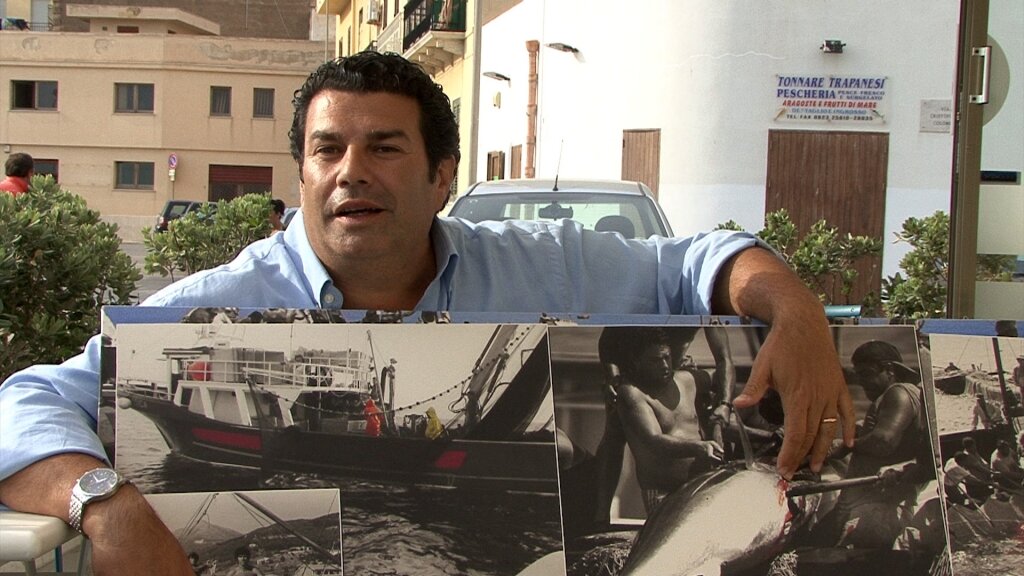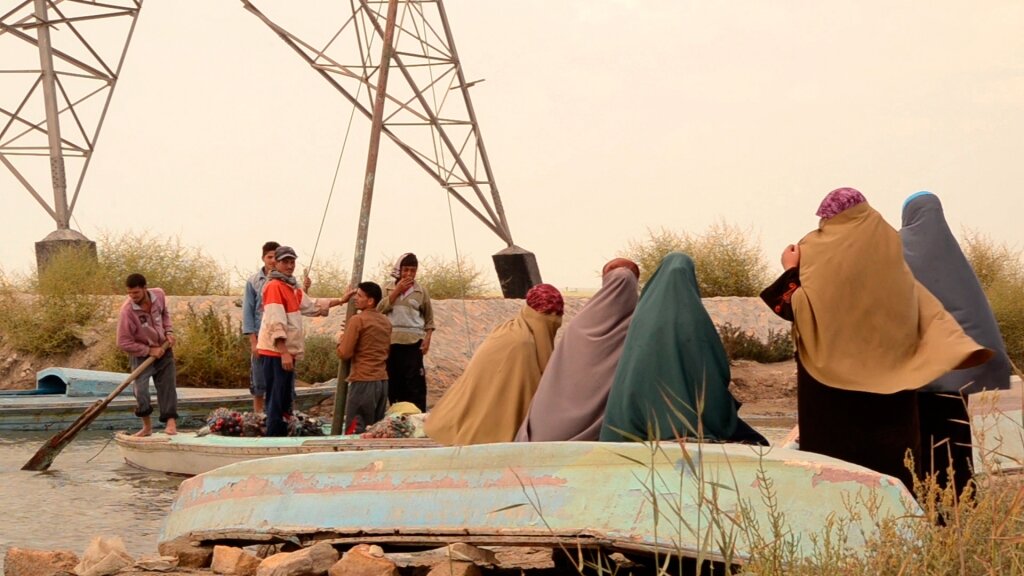13. Lives and Legends of the Mediterranean Sea 2011-present
The Heraclitus crew documented changing cultures of the Mediterranean, filming over 150 interviews with sea people and coastal citizens around the Mediterranean. The Heraclitus entered drydock in Roses, Spain in 2012 while an interview team continues its cultural and oral history expedition in the Eastern Mediterranean. An exhibition is being prepared, The Gift, focussing on the reciprocal nature of human cultures and the sea.
Quotes:
“It used to be a way of life. Now it is just food. There used to be a lot of fishermen here. Now there are only a few.” She says there used to be lots of people selling fish in the street. Now it is only her. She points to the tourist shops and restaurants across from her little fish stand and says, “there used to be groceries sold there and rows of fish being sold here.” –Nuria Barachina Gonzalez – 80-years old, Cadaques, Spain
” What changed the most is the magic of traveling has turned into an act of consumption… It makes it easier for many people but at the same time they don’t get this thrill I… this connection with the very far away… That’s why I started choosing deliveries on more distant destinations. I started to really enjoy crossing the Red Sea, or the distant islands of the Indian Ocean, because then you don’t get this feeling of these places already being spoiled by such tourism.”
”The main task today and I think the Heraclitus is part of this task… and that is re-enchanting the world…. only one thing that is worth accomplishing these days… what I try to do… again with this orchard… following the setup of one guy a Scottish adventurer who started this orchard… learn more about this guy… can see this rock where he was buried… trying to put the pieces of the puzzle together but trying to respect and not spoil the mystery of it… the way you tell stories… to tell it to keep the mystery together….it’s how it’s told.”
— Bruno Catonnie, sailor and orchardist Corsica
“Italians bring a special kind of fishing to Corsica. Because of the history of coastal raids and pirates, Corsicans live inland in the mountains. Italians brought coastal fishing to Corsica.”
”The protected areas are good for the fish but not so good for the fishermen.”
“Corsica now is more for tourists. The fisherman is not part of the scenery for the tourists… though they like to eat fish at the restaurants.”
” When I started fishing, there were 600 fishermen in Corsica. Now there are only 300 and not many young people are interested in fishing.”
”I was 17 years old and going out and fishing with my father. It was a sunny day with a bright blue sky. We were fishing and then my father said, “Cut the net.” I did not agree and did not do it. He told me again to cut the net but I did not want to. They he bounded across the boat and started cutting the net himself. He told me to go below and close up everything. He said we had five minutes. I went below but I thought he was crazy. I did what I was told and in five minutes a huge tempest blew up. The boat was tossed by huge waves, the wind was very strong and there was rain and hail and ice in the sky. If we had kept the net out we would have sunk. Later I talked with my friend, who was the same age and had been out fishing with his father on the same day. He told him, it happened exactly the same with him. His father told him they had five minutes. ”
— Joseph Luci fisherman Corsica
It was my first time in Libya in Gulf of Sirte. Again I was spear fishing with my father and brother. We hear some strange voice in the water and a beautiful dolphin arrives and says “hello”. It was my first time to see a dolphin in the water. Libya is the real Mediterranean. It is a rich sea because Libya is a poor country and doesn’t have fishing. Their sea is the real Mediterranean like the sea my father saw when he was a child.
I met this Sicilian fisherman during my trip with my family. He is a tuna fisherman. He is so big, so tall, and so strong. His eyes are so totally different. His eyes show an emotional man with lots of stories in his life, and lots of big fish in his life. I remember he came out of this boat holding a tuna like a baby in his hands. I think this fisherman is a real sea man. I want to become a little bit like him.
“I think the sea is the breath of the earth… The most important is thing is the new generation. They need to be educated in the schools about the sea and learn how to not use it as a trash basket.
— Clemente Serafini Italian, Rome, diver and crewmember of Heraclitus
”During my father’s time we sold fish in front of the arches — on veranda/porch — in old times the women involved in everything but fishing — ran the business — take care of everything. The behavior of customers changed — people do not have time to fillet fish themselves. The size of fish changes. They are smaller. Fishery has changed. I think mankind is just destructive.”
”Once the problem was selling and not fishing. Now the problem is fishing and not selling… The demand for fish is bigger than supply. ”
–. Giovanni Delmonte – former fisherman and son of many generations of fisherman and a FISH MONGER in shop. Imperia, Italy
“The fish we caught: mustelle, gobbi, and bordette (soup fish) sgitti, octopus and cuttlefish. We took little crabs in winter… went out in night to long-line… small long-line all night long. Sometime women helped on the boat.
The lines were made of hemp… sometimes we harpooned the fish…
not much education so people learned from stories of people who traveled and came back home. That’s how I started thinking about going somewhere else.I am happy and always improving.”
”I design my own nets. Thanks to politicians we are forced to limit our catch when we could catch more with less expenses, Every improvement we proposed is rejected. The net I am repairing is an experiment. I am building it upside down… inverting float line, gill net then other net then led line… experiment. We harvests occhiata — look like sea bass with big eyes – Lampuga and Morone — brown fish false salmon.
“The same net, with meter of margin for dolphins to escape. This is used for marone — used by 35 boats, between Loano and Sanremo. 5 and 40 nautical miles off coast. Learned with father and grandfather — all nylon — not cotton now but the same technique and shape.”
— Salvatore Greco, “Turi” Imperia, Italy 18/3 2013 March (father and the owner of the boat “Picolla”)
”I love to fish anything but the most important is the nature… if you put me in an office, I would escape. I want the sea, the sun.”
— Luca Greco Imperia 18/3 2013 March 18 (son of Sakvatire Greco and fishing captain on father’s boat “Picolla”)
“My grandfather who had a wooden leg would row the boat in sciabica. This is a type of fishing from shore . You have little boat that rows out with a net, describing a large curve to take it out and bring it back to beach where people haul it in with the fish. It was a 5 meter boat. The fishing takes all day and he rowed this boat in and out with a wooden leg, from morning to evening – all day. What strength and endurance!”
”Fish are intelligent. Otherwise they would not get big. I am so sorry that I did not have a camera to show you how it was. There were no cruise liners, no pollution.”
”I love the sea, the fishing. I saw sunsets and sunrise you would not believe. We fishermen do this with respect for nature because we know it. Sometimes I know we have to restrain ourselves to avoid overfishing. There are not many who think the same way.”
— Salvatore Di Nucci fisherman Imperia, Italy
”Many old professions like fishermen, boat builders, sail makers nearly disappeared because families converted to serving tourists. The traditions have not been passed down to youth. If this is not gathered and recorded, the history and traditions will die and be forgotten.”
“The maritime culture of this area is unique like Fano is different. Every area is different. It leads to a different identity. Like those to the north of Pesaro. The differences are driven by response to the different morphology of the coast. That leads to different responses and different techniques. ”
“There is a common language of the sea and those living on the coast. There are more similarities between all the coastal people than there is between the land people and the sea people.”
“If a fisherman dies, his wife becomes the patriarch. She will decide who does what in the family. She distributes the catch. There is a term “parcenevole” which means the guy or girl who is a full crewmember but does not go to sea. Instead they handle all the logistics on land. They have high status, almost like a captain. ”
”… The eyes on the bows of fishing boats. These fishermen couldn’t read and the knowledge was carried through stories. In Chioggia the eyes are painted. In Pesaro they are sculpted. The ships are like members of the family. They have distinctive sails to identify which family or clan they are from. This was part of the procedure to give a boat a soul. The plisso – a toupee on the bow is an ornament and represents hair. The procedure also includes sacrificing animals to ask for a safe return to port.”
“There is also a special knife with a black handle. The captains would throw it into the main mast while swearing as a ritual to keep danger away. The ritual and the secret curse would be passed from father to son during Christmas night. This marked the transition of leadership on the boat and family.”
”I don’t want this work to be nostalgic. I… to tell the story about the past. To make it possible to use tradition to fight globalism. The past with its respect for nature and the environment… we need to keep local traditions not because they are better… but to put in a holistic relationship between people and place… We need to find a new way to make people listen to old stories. They have to tell these stories and understand that the garlic and parsley in the food aren’t just there for taste. The garlic controlled worms and parsley helped with taste… I want to surprise people, to sneak it into the brain.”
— Maria Lucia De Nicolo, – professor and museum director of maritime museum specializing in ancient traditions of fishing and the role of women in fishing communities. Pesaro, Italy




